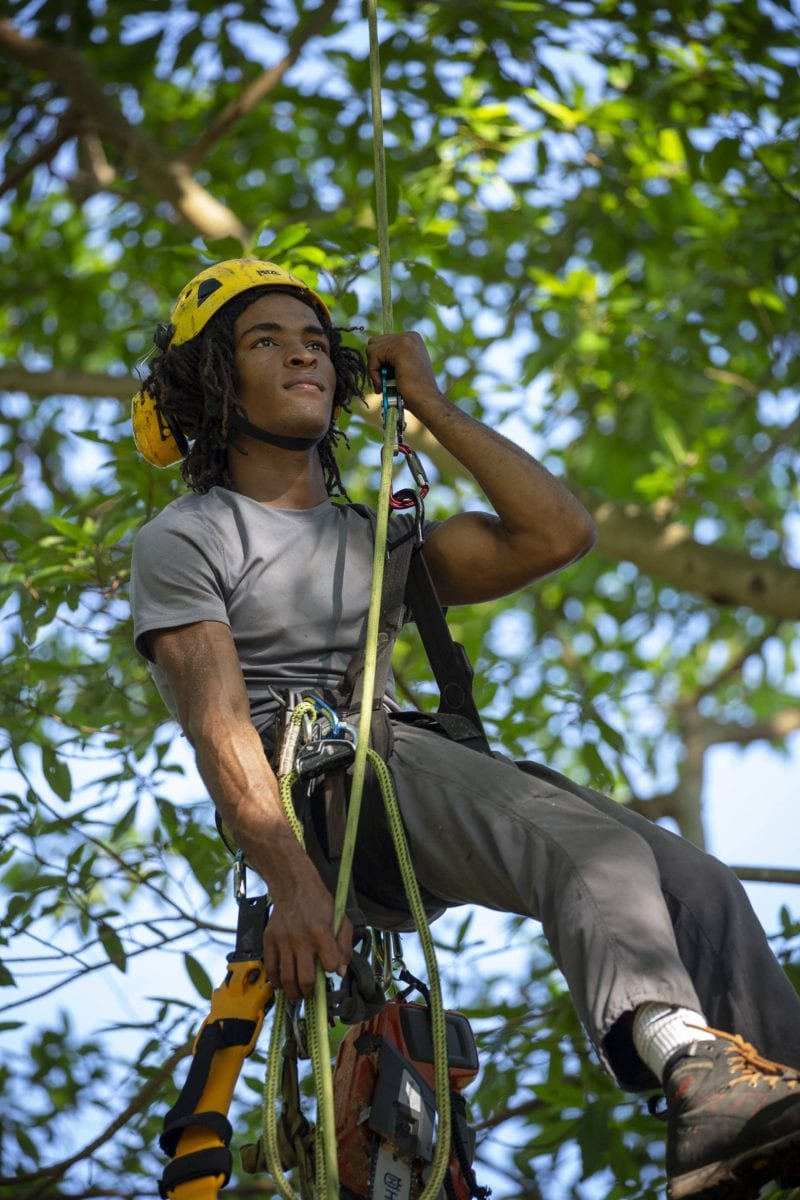In some city neighborhoods, shade trees line the streets and tower over homes, cooling the air and purifying it, boosting people’s moods and health, and even generating jobs.
But for many people, that picture doesn’t reflect their own neighborhood. Low-income and Black, Indigenous and People of Color (BIPOC) communities tend to have far fewer trees than wealthier, predominantly white, neighborhoods do. This inequity results in disparities in the essential health and economic benefits that trees provide, which has spurred TAZO Tea and American Forests to team up to address the urgency of climate justice.
In 2021, we launched the TAZO Tree Corps, an initiative that will use tree planting and maintenance to help combat climate change and create new paid, locally hired jobs in economically disadvantaged neighborhoods and communities of color across the United States.
The TAZO Tree Corps aims to transform lives by training and employing people from BIPOC communities to plant and care for trees in the neighborhoods that need them the most. Targeting five cities, the program launched in 2021 in Minneapolis, San Jose, Calif., and Detroit. In 2022, the Tree Corps expanded employment opportunities to Richmond, Va., and Pittsburgh. The partnership also will sponsor a green jobs fair at Bronx Community College to connect young people to employers in urban forestry and other green fields.
“The climate crisis is no longer a future problem — it’s here now, and BIPOC communities are disproportionately at risk,” says Laraine Miller, president of ekaterra Americas, which owns TAZO. “As a brand rooted in challenging the status quo, we believe we have a role to play in fighting for a sustainable and equitable future, which is why TAZO is announcing the first steps of a long-term purpose ambition to fight for climate justice. Climate change is not only an environmental issue, but also a human rights issue, so we’re getting started by focusing on the racial injustices that must be addressed to make meaningful progress within the climate crisis.”
American Forests’ urban work focuses on achieving Tree Equity, a vision for all people in every community to receive the benefits that trees provide, regardless of income, race or location. But planting trees alone isn’t enough to create Tree Equity. Cities need people who can plant and take care of those trees so that they’ll flourish and provide benefits for years to come. The neighborhoods with the highest need for trees also tend to have the highest unemployment.

“By partnering with TAZO to create the TAZO Tree Corps, we are taking a major step forward in American Forests’ path to achieve Tree Equity,” said Jad Daley, president and chief executive officer of American Forests. “We are building a national movement to ensure that every neighborhood can experience the healing power of trees while also helping create green jobs that benefit people in socioeconomically disadvantaged communities.”
In each of the five cities, the TAZO Tree Corps selects five fellows who take part in two to three weeks of paid urban forestry training before transitioning into full-time employment with The Davey Tree Expert Company, a nationwide tree-planting and tree-care business. Tree Corps members will also be trained in climate justice advocacy.
Many cities currently have a shortage of people qualified to care for trees, and the need is expected to grow. Urban forestry will see a 10% increase in job openings for entry-level positions through 2028, according to the U.S. Bureau of Labor Statistics. Many of those jobs will be for planting, trimming and pruning trees. Nearly 25% of the people who will fill these jobs will likely be self-employed, so this type of opportunity can set the stage for entrepreneurship, improved economic mobility and a better quality of life.
“The TAZO Tree Corps helps us turn this work into new economic opportunity for people from disproportionately impacted communities,” said Tiffany Mrotek, American Forests’ director of Career Pathways, a program designed to get more people from socioeconomically disadvantaged backgrounds into urban forestry careers.
“This model, which places people directly into jobs and provides support they need to transition to an urban forestry career, is catching on. We’ve begun replicating this comprehensive approach in cities nationwide to help create healthier neighborhoods and increase career opportunities in communities with the most need.”